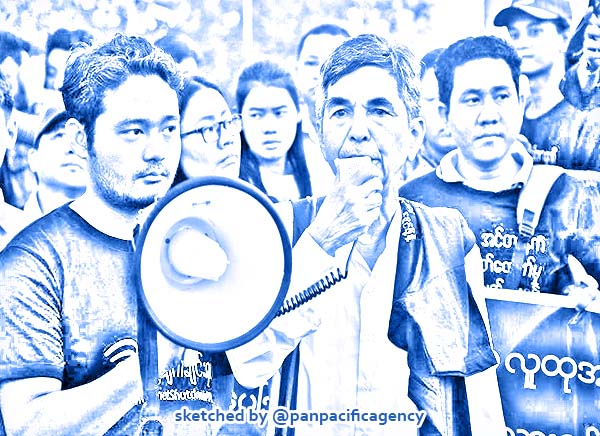Myanmar’s protesters demand end to internet blackout in Rakhine

U Oo Hla Saw, an ANP member of the Lower House for Mrauk-U, speaks at the protest and urges the international community to help end the internet suspension. Photos: Nyan Zay Htet. Sketched by the Pan Pacific Agency.
YANGON, Dec 26, 2019, Myanmar Times. Around 50 activists, mostly ethnic Rakhine, protested in Yangon’s Mahabandoola Park on December 24 against the government’s ongoing internet shutdown in northern Rakhine State, Myanmar Times reported.
U Oo Hla Saw, an ANP member of the Lower House for Mrauk-U who spoke at the protest, told The Myanmar Times that “from any point of view” the blackout was “a great loss” economically and socially for his constituents. He said cutting off the internet violates basic human rights.
Daw Aung San Suu Kyi’s government ordered the four telecom operators to suspend internet services on June 21 in nine townships across northern Rakhine and Chin. Ministry of Transport and Communications permanent secretary U Soe Thein previously told local media that “the ban was to maintain the stability and law and order in these areas” following clashes between the military and the Arakan Army, an ethnic Rakhine rebel group.
Services were subsequently restored to five townships but the four townships of Ponnagyun, Mrauk-U, Kyauk Daw and Minbya remain cut off.
U Oo Hla Saw said he strongly supported the Yangon protest.
“Everybody knows that Burma [Myanmar] is in a democratic transition. But we [still] cannot fully enjoy democratic rights, especially for the Rakhine people. In Rakhine, there is communal violence, military conflict and – after that – now we have no internet access. Internet access is a universal right. But now we cannot enjoy that. This is unjust,” he said, calling on the international community to help end the blackout.
Aid agencies and rights groups have repeatedly warned that cutting off internet access has endangered the livelihoods and safety of local communities and exacerbated the humanitarian crisis. The blackout has made it more difficult for internally displaced people (IDPs) to access aid, and for aid groups to reach them.
The shutdown, as The Myanmar Times reported earlier, has also added to the difficulties for communities to access digital payment systems, cutting off their ability to send and receive remittances and money transfer.
U Oo Hla Saw echoed these concerns and said that the suspension has damaged the livelihoods of local communities and their access to health and medical services.
Another ANP lawmaker, Rathedaung township MP Daw Khin Saw Wai, submitted an emergency proposal to parliament to restore internet services in July but the tabling was rejected by the speaker.
Protester Ma Aye Thinzar Moe, an ethnic Kaman born and raised in Yangon and whose parents are from Sittwe, said that it is extremely challenging to rely on SMS messages to share and exchange information without the internet.
“It is difficult for both the young and the old. It also feels as if a blackout on news information is imposed on us [in northern Rakhine],” she told this newspaper, adding that the ban is not an effective way to counter disinformation or misinformation.
Another protester, youth activist Ma Thinzar Shunlei Yi, said the suspension was “a clear alarm” to both consumers and investors in Myanmar’s digital economy because it shows that access in the country “can be taken away anytime by giving different excuses.”
“Businesses, civil society and the media all have a responsibility to push the government to lift the internet ban and ensure this will not happen again in Myanmar,” she added.
In a statement on the protest, Maung Saungkha, a director of rights group Athan, warned that the electoral authorities would find it difficult to conduct any polls in areas without internet services. Myanmar is due to hold parliamentary elections in late 2020.
Twenty civil society organisations in Myanmar last Saturday issued a joint statement condemning the move as disproportionate to the government’s national security justification.
The statement, signed among others by Athan, Free Expression Myanmar (FEM), Myan ICT for Development Organisation (MIDO), Progressive Voice and Rakhine Youth New Generation Network, said the restriction would only worsen the conflict.
The UN in November joined calls to end the blackout, calling it “a significant impediment” to its work and communications in the area. Foreign investors also warned of the “reputational impact in the international community and view of Myanmar as a responsible investment destination” being brought by the ban, especially when Daw Aung San Suu Kyi is keen to draw investments into the restive state.
The government has not explained its reasons for the lengthy and indefinite shutdown.
This month the tourism ministry barred tourists from travelling to Mrauk-U, Ponnagyun and Minbya, citing clashes between the Tatmadaw and the Arakan Army. Journalists are not allowed to independently travel to northern Rakhine.